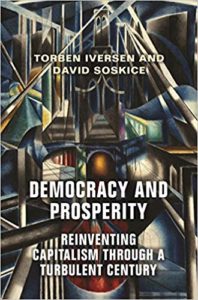How Democratic Capitalism Works
By Arnold Kling


- [T]he large skilled work forces of the advanced sectors of the economy, and the aspirational voters who seek to join these workforces, have interests aligned with the promotion and success of advanced capitalist sectors, and are generally decisive voters.
- —Torben Iversen and David Soskice, Democracy and Prosperity: Reinventing Capitalism Through a Turbulent Century,1 page 6
Iversen and Soskice offer a much more optimistic outlook. They see democratic capitalism as a self-healing system that has survived more than a century of wars and crises.
Iversen and Soskice see skilled workers as the glue that holds the liberal order together.
- Not only is labor skill-intensive in the advanced sectors, those skills are tacit (i.e., difficult to codify) and cospecific with other skilled workers, and they are also cospecific with the relevant technology… This implies that the skilled workforces of advanced companies are colocated and have to work physically together… colocation has increased in the knowledge economy, despite the internet… in the form of skill clusters, so that knowledge is geographically confined, and both workers with the relevant skills and knowledge-based companies wanting to tap into the relevant knowledge cluster have strong incentives to locate there.
- … Because whole workforces are extraordinarily difficult to relocate… advance companies (or their subsidiaries) are relatively immobile. (pages 14-15)
With both labor and capital committed to specific locations in order to take advantage of skill clusters, there is a significant share of the population that has an interest in electing a government effective at providing public goods. In A.O. Hirschman’s terms, these citizens cannot exit their jurisdictions. They therefore have an incentive to use “voice” in a democratic system. They make up a constituency that will demand education and other public goods and that will reward politicians who enact economic policies that foster competition and growth. As the authors put it:
- … a majority of voters want to see advanced capitalism succeed. They derive their prosperity from the success of the advanced sectors, and they therefore have an incentive to support parties that promote the advanced sectors using a variety of policies, including exposing business to competition as a means to spur innovation and growth. These policies are market-enhancing, and therefore entirely compatible with the success of capitalism as an economic system, though not of individual companies, and they typically garner broad cross-class support. (page 31)
Many economists and political scientists have been concerned that democratic capitalism can degenerate into corporatism, in which the political process is dominated by rent-seeking firms. Iversen and Soskice say that once a skill cluster has developed, firms have less bargaining power with politicians, so rent-seeking can be resisted.
In fact, the inability to relocate may mean that the state can extract resources from the business, rather than the other way around. That may explain why firms seek subsidies when they are making location decisions. The firm knows that once it makes its decision, its bargaining power disappears. Tyler Cowen has discussed this dynamic in the context of Amazon’s decision about where to locate major new offices.3
Several economists have described a “middle-income trap,” in which countries that have emerged out of poverty are unable to join the “club” of richer nations. Iversen and Soskice argue that this is due to the difficulty of starting the virtuous circle of advanced sectors nurturing skilled work forces while government provides public goods. Instead, middle-income countries are stuck with firms that are not sufficiently advanced to compete in world markets. These firms depend on protection provided by the government, and the political leaders in turn depend on support from the owners of the firms in order to stay in power. Without an advanced sector competing in world markets, there is no constituency for policies that foster dynamic capitalism rather than rent-seeking.
Iversen and Soskice warn that the structure of the economy has changed in recent decades. In the mass-production economy that prevailed through the first two-thirds of the twentieth century, skilled workers and semiskilled workers were complementary. In an automobile manufacturing company, there are gradations of skills, and workers at all skill levels understand how they depend on one another. But more recently, knowledge-intensive industries:
- … have severed previously strong complementarities in production between skilled and semiskilled workers. Deindustrialization contributed to this process by gradually segregating many low- and intermediary-skilled workers into insecure, often part-time or temporary, service jobs. The combined effect of new technology and deindustrialization has been a divergence in employment security and income between core and peripheral workers, with the college-educated in much more secure positions.
- … the transition to the knowledge economy has reconfigured political divisions and the party system. Semiskilled workers—and sometimes their children—have largely lost their foothold in the dynamic sectors of the economy and are increasingly… delinked from their erstwhile peers in industry… Workers with high school degrees… increasingly live in small towns and rural areas, which have for the most part lost their importance as suppliers for the urban economy.
- Politically, many among these left-behind groups have abandoned traditional center-left parties, which are increasingly chasing the emerging urban, educated voters… Instead, many have thrown their support behind populist parties… (pages 43-44)
Yet the authors remain optimistic about the prospects for democratic capitalism.
- Populism seems not such a problem in coordinated systems where education, training, and retraining systems are effectively organized. (page 275)
They have in mind some of the countries of Northern Europe.
Conclusion
Democracy and Prosperity tells an internally consistent story that appears to explain many aspects of the success of democratic capitalism. I found it interesting, although not entirely convincing. My doubts included the following:
—The book presents a strongly materialist account of political economy. According to Iversen and Soskice, the types of industries that emerge determine the structure of the workforce. The structure of the workforce in turn determines the characteristics of the political system. This account leaves no room for ideology or for cultural factors as causal influences.
—The case that Iversen and Soskice make that coalitions of skilled and semiskilled workers favor pro-capitalist economic policy struck me as a bit of a “just-so” story. It is contradicted by findings that voting behavior is not nearly so sophisticated.4
—Finally, the sorts of training and retraining programs that the authors say are working in Scandinavia have been tried in the United States without success. I am not convinced that policy makers have a solution available to the challenge of re-integrating semiskilled workers into the advanced sectors of the economy.
Footnotes
[1] Torben Iversen and David Soskice. Democracy and Prosperity: Reinventing Capitalism Through a Turbulent Century. Princeton University Press, 2019. (As an Amazon Associate, Econlib earns from qualifying purchases.)
[2] See my review of Gurri’s book, “The Insiders versus the Outsiders”. Note that subsequent to this review Stripe Press published a new and expanded edition, including a print version, for which I contributed a foreword.
[3] See “Are the New York Subsidies to Amazon Really So Outrageous?” by Tyler Cowen.
[4] See Bryan Caplan, The Myth of the Rational Voter.
*Arnold Kling has a Ph.D. in economics from the Massachusetts Institute of Technology. He is the author of several books, including Crisis of Abundance: Rethinking How We Pay for Health Care; Invisible Wealth: The Hidden Story of How Markets Work; Unchecked and Unbalanced: How the Discrepancy Between Knowledge and Power Caused the Financial Crisis and Threatens Democracy; and Specialization and Trade: A Re-introduction to Economics. He contributed to EconLog from January 2003 through August 2012.
Read more of what Arnold Kling’s been reading. For more book reviews and articles by Arnold Kling, see the Archive.
